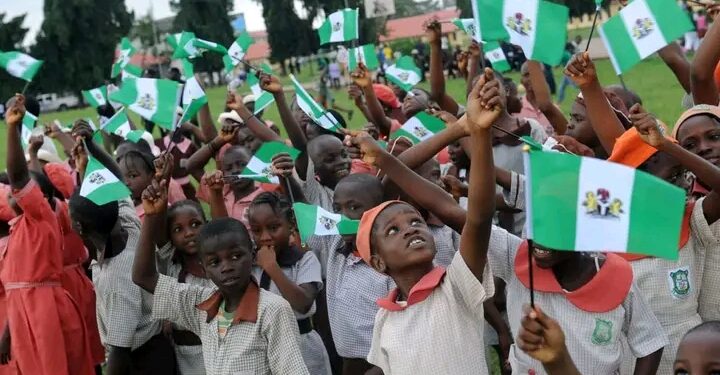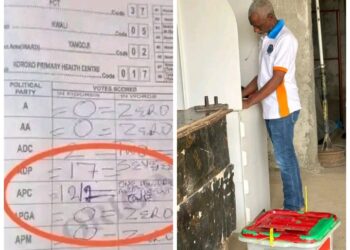President Bola Tinubu has reaffirmed his administration’s strong commitment to the protection, welfare, and development of Nigerian children, as the country marks the 2025 National Children’s Day.
This was contained in an official message released on Tuesday by the Special Adviser to the Presiden on Information and Strategy, Bayo Onanuga.
The president described children as the “pride and future” of the nation, emphasizing the government’s duty to provide a safe, nurturing, and inclusive environment where every child can thrive and realize their potential.
President Tinubu stressed that the country’s future rests on the shoulders of today’s children, who he described as the heartbeat of the national fabric. He pledged his administration’s continued protection of children’s rights and dreams across all parts of the country.
This year’s Children’s Day theme, “Stand Up, Speak Up: Building a Bullying-Free Generation,” was described by the president as timely and necessary, with a call for a culture that ensures every child is safe, respected, and heard, whether in schools, homes, or online platforms.
Quoting global statistics, the president lamented that one in three children experiences bullying, with Nigerian studies indicating that as many as 65% of school-age children face some form of abuse or aggression.
“A child who learns in fear cannot learn well. A child who grows in fear cannot grow right,” he said.
President Tinubu outlined a series of measures his government is pursuing to address these challenges. Central to the plan is the recently launched National Plan of Action on Ending Violence Against Children (2024–2030). A framework outlining clear strategies to prevent abuse, punish offenders, and support victims.
The president also revealed the review of the Child Rights Act (2003) and the Violence Against Persons (Prohibition) Act (2015) to expand the scope of protection and strengthen enforcement. He added that the Cybercrime Act is being applied to shield children from threats in digital spaces.
While acknowledging that all 36 states have now domesticated the Child Rights Act, Tinubu urged for a broader community-driven response involving parents, teachers, religious leaders, and civil society to ensure real impact.
The president further disclosed that the government is scaling up the Child Protection Information Management System (CPIMS), to enhance the capacity of frontline responders, and running nationwide sensitization campaigns through the Ministry of Women’s Affairs.
He also announced plans to establish a comprehensive framework solely focused on child protection and development, with specific attention to accountability and program delivery.
On the education front, the president said the government has introduced a National Policy on Safety, Security, and Violence-Free Schools, and has issued new guidelines for school administrators.
“Social-emotional learning and child safeguarding are now being integrated into teacher training,” he added.
The president highlighted the role of the National Commission for Almajiri and Out-of-School Children in ensuring inclusive education for all, regardless of background.
The country’s number one citizen also said his administration is expanding access to maternal and child healthcare services, including the scaling up of Mother and Child Hospitals across the six geopolitical zones. He pledged further collaboration with state governments to ensure similar facilities are provided nationwide.
He also announced the development of new national guidelines for alternative care for children, which will support those who cannot remain in their biological families. These efforts, he said, complement the broader National Plan of Action on Ending Violence Against Children.
To combat hunger and improve learning outcomes, the president said his administration is sustaining the Nutrition 774 program and the School Feeding Scheme, both aimed at improving nutrition and cognitive development among children.
President Tinubu noted the establishment of a Department of Nutrition under the Ministry of Women’s Affairs to better coordinate child and maternal nutrition efforts nationwide.
He further mentioned the introduction of social protection measures, including a Universal Child Grant and a Child Wellbeing Index, which will help track progress and identify gaps in child development.
As part of public engagement, the president launched a nationwide campaign themed “See Something, Say Something, Do Something,” encouraging citizens to report child abuse and stand up for children’s rights.
To the children of Nigeria, Tinubu sent a heartfelt message: “You matter. Your dreams matter. Your voices matter. If you are bullied or harmed, speak up—you will be heard and protected.”
The president called on all levels of government and society to prioritize child welfare in their planning and budgeting. He praised states already taking concrete steps and urged others to follow suit.
President Tinubu concluded with a powerful message of hope: “Let today mark the beginning of a renewed movement to build a Nigeria where no child suffers in silence, no child is left behind, and every child grows in dignity, peace, and love.”





